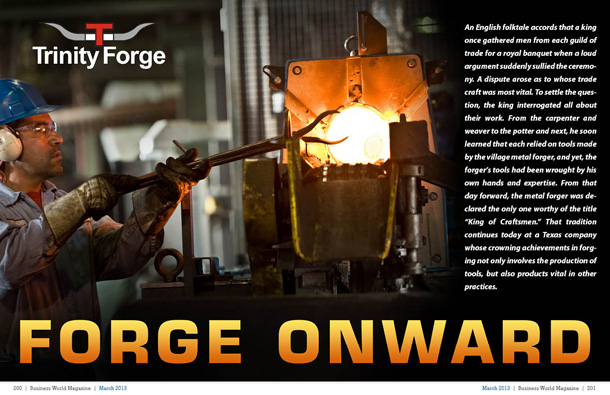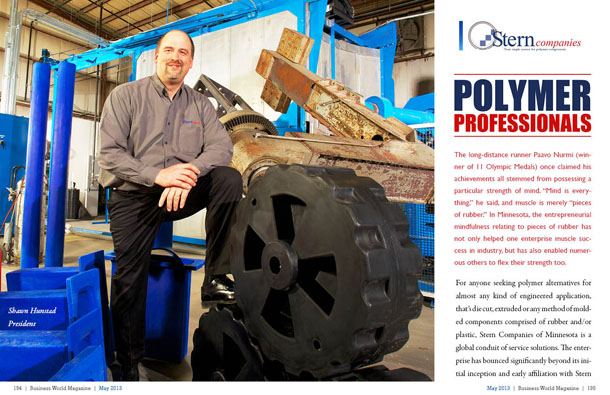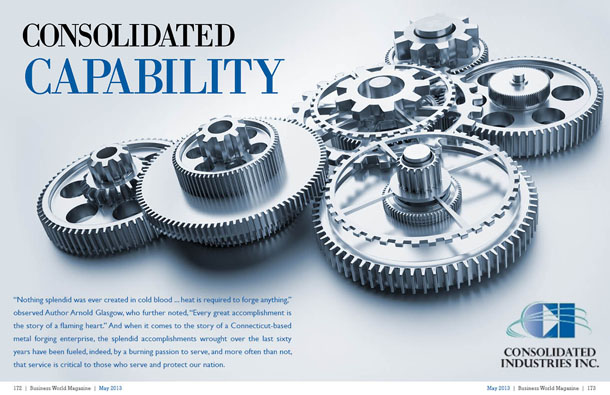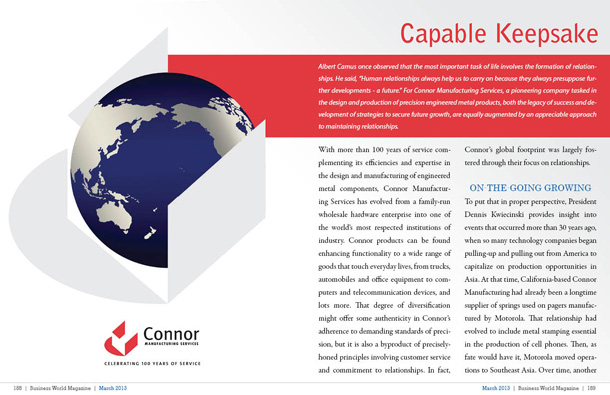Forge Onward.
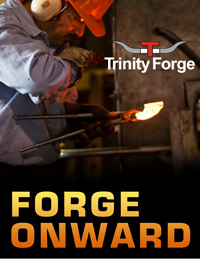
An English folktale accords that a king once gathered men from each guild of trade for a royal banquet when a loud argument suddenly sullied the ceremony. A dispute arose as to whose trade craft was most vital. To settle the question, the king interrogated all about their work. From the carpenter and weaver to the potter and next, he soon learned that each relied on tools made by the village metal forger, and yet, the forger’s tools had been wrought by his own hands and expertise. From that day forward, the metal forger was declared the only one worthy of the title “King of Craftsmen.†That tradition continues today at a Texas company whose crowning achievements in forging not only involves the production of tools, but also products vital in other practices.
From its base in Mansfield, Texas, Trinity Forge is recognized as an industry leading manufacturer of quality, closed-die forgings and machined parts. Their capabilities are manifest upon all manner of metallurgy, from carbon, stainless and alloy steels to nickel alloys, aluminum bronze, titanium and lots more.
An on-site machine shop (which includes CNC lathes, live tooling capabilities and vertical/horizontal machining centers) additionally allows Trinity to offer clients with a convenient and exceedingly capable, one-stop-shop for finished machined parts. Trinity routinely produces components of intricate shape (in size-ranges of a few ounces up to 100 pounds) and has secured renown as a respected provider of top-of-the-line hand-tools as well as forged goods vital to interests in oil & gas, mining, power generation and varying types of industrial equipment.
The Early Hurstory
The company actually began life in Hurst, Texas, a community near Dallas and Fort Worth which is situated near the Trinity River. In the early 1950s, there were three men who worked for another forging endeavor that fluctuated between services to aircraft companies and to those involving oil & gas. By 1955, these three men determined to take control of their professional destinies by creating their own firm. While one would only stick it out for a short time, the two others (Wade Forman and Harry Withers) went on to oversee growth of their customer base while continually investing in new equipment to build upon their service capabilities. Forging goods up to ten pounds, then up to 20 pounds, as Trinity’s product weights expanded so too did the community around it. As urban expansion began to squeeze operations, Trinity decided to relocate from Hurst to its current 38-acre site in Mansfield.
Harry Withers would tragically die in 1972, but his son, Dennis, worked his way up from sales to executive vice president and co-managed the company with Forman, becoming sole president when Forman passed in 1996. A veteran of the U.S. Navy, Dennis Withers formerly served as a ship superintendent who coordinated the repair of vessels at naval facilities in Japan, but later, through an appointment to the staff of the Naval Air Force Pacific Fleet Commander, was also tasked with managing aircraft carrier maintenance services as well as the material management systems. For his service, Withers would earn the U.S. Navy Achievement Medal.
That achievement was a byproduct of Withers’ well-honed “can-do†attitude and approach to duty, which would certainly prove to effectively fit in with the environment at Trinity Forge.
To put that in proper perspective, Trinity’s current president Dick Johnston explains how the company has always conducted its business with an attitude uniquely nuanced by conditions associated with the oil industry.
Trinity’s longest established product lines includes valves, fittings and parts used in the hook-up of critical pressure applications (think high pressure pumps) and drilling components used for oil, gas and mining. Johnston asserts these industries “demand quick response†and when the need or situation dictates, suppliers must be fully engaged and ready to rapidly respond to the call of duty, as needed, when needed. Johnston credits Trinity’s speed and flexibility as the qualities that allowed the company to initially capture and maintain so many customer relationships. Yet, Johnston explains, “As we moved on to serve other industries, we found those same attributes were also welcome… to this day, speed and flexibility continues to represent the area in which we most shine… providing what someone wants, when they want it, and how it is wanted.â€
Johnston has worked at Trinity Forge for more than 35 years. Having initially served as a data processing manager and administrative manager, Johnston’s early service included helping the company transition from all manual systems to computerized databases. Later, as vice president of manufacturing, he oversaw efforts which led to Trinity achieving status as one of the very first ISO-9000 certified companies in its industry. While those accomplishments, coupled with considerable sales growth, could effectively serve as points of pride, Johnston says it is the corporate values of Trinity Forging which add most appeal to the work environment.
Value-Added Strength
For all of a metal’s inherent strength, it still possesses characteristics that, over time and stress, will diminish its capacity to perform. Through forging, metal is heated and worked through a systematic process of pressing, pounding or squeezing under such intense pressure that it ultimately yields a product of strength far more superior than anything made from any other metalworking system. As Johnston asserts, “the only thing better than a forging is a heat treated forging.†And it is for this very reason, forging is especially fundamental in conditions that depend and demand both reliability and safety. Johnston says the awareness of the critical performance requirements of their products has always prompted particular attention-to-detail at Trinity Forge. As their business has heated up by service to new industries, as they grew to efficiently respond to the pressures of market force demands and competition, Trinity Forge has been similarly strengthened by its forging of core principles that Johnston says penetrate into every aspect of business operations. He identifies these as value, service and integrity.
“Value is our assurance that a customer, and that includes the end consumer, is getting the most per dollar they spend,†says Johnston. “When we make a tool, and we make tools which are sold to customers who go on to sell them to consumers throughout the world, our goal is to make it so that it never fails you. It is something that can last you for all your life and then you can pass it down to your children.â€
You won’t find examples of Trinity’s tool-making tenacity in the “$1.00-buys-any†section of your local hardware store. Yet, when it comes to open-end wrenches, combination wrenches and other tools that can withstand several lifetimes of application, good chance you’re seeing something manufactured by Trinity. Again, its long-term effectiveness and dependability is a derivative of Trinity’s focus on value.
Service, explains Johnston, can be very intangible when tied to a product, but at Trinity, it means going the extra mile to ensure customers are receiving what they want, where it is wanted and when it is wanted. The company constantly assesses each point of interaction that directly impacts their relationship with clients. “We look at every place where our practices, our products, touch the customer, and we focus on giving them what they need,†he says.
As for integrity, Johnston says just as customers rely on the integrity of products, integrity is at the core of how Trinity conducts its business. He offers an analogy, “Suppose you find out that your company is going to be featured on ’60 Minutes’ – Do you encourage your kids to watch it or do you hope they won’t see it?†asks Johnston. “We’re very proud of the work we do here, and when you work somewhere that lets you, not only live with, but feel good about what you’ve done, that’s a good place to work. We do the best we can to treat people the way they should be treated, inside and outside the company, and still live up to the philosophy that a handshake is as good as a contract,†says Johnston.
Forging Through the Future
Trinity Forge is poised for a new era of service and Johnston expresses optimism with potential opportunities that have arisen out of company events in recent months. Trinity just recently completed a leveraged recapitalization with Lone Star Investment Advisors LLC, a Dallas-based private equity firm whose specialties involve leveraged acquisitions and recapitalizations of businesses deemed as “strategically viable … with strong potential for growth.†Lone Star has traditionally invested in a wide variety of industry sectors which including manufacturing/industrial, distribution, business services and energy. Upon closing the deal, Johnston said Trinity was especially eager “to pursue new avenues of growth while preserving the pillars of our success: value, service, and integrity.”
To qualify that statement, Johnston says the company’s capitalization will lead to new opportunities for the company, and at present, he and other decision-makers are constructing something of a “wish list†that would lead to the prioritization of strategies to go from great to greater. As for what comprises his wish list, Johnston only acknowledges, “When a kid sits on Santa’s lap, he doesn’t just look at him with a blank stare.†Beyond that, Johnston is holding his cards close to the chest.
Otherwise, he confirms that the machining services provided by Trinity remain the fastest growing segment of the company. While those processes started off slowly, he says more and more customers are relying on lean manufacturing methodology and Trinity’s ability to provide additional services under one roof helps save their customers save both time and money.
While Trinity’s sales have long been dominated by needs in Texas, he anticipates the company will secure greater future sales in markets developing overseas.
He also sees increasing opportunities for Trinity to serve in industries that include aerospace, agriculture, and defense. At present, the company is working on one particular defense project that involves the forging of a new material. Johnston calls it “a very special application†leading to a forged metal of property strength particularly useful in terms of battlefield armament. Trinity is pioneering the forging of these new materials which will serve in our national defense strategy, following what has been a long cherished tradition of this industry.
Johnston does hint that more good news will come from the company in the yet undetermined future, and says, “We’ve been growing since 1955. Why would we want to stop now?â€
Preferred Choice of Vendors:
Â

